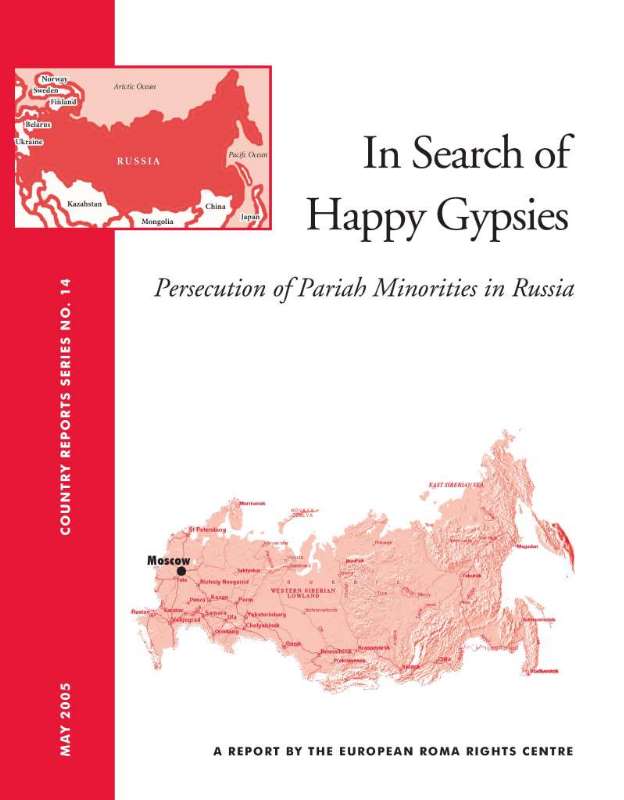In Search of Happy Gypsies: Persecution of Pariah Minorities in Russia
09 May 2005
In Search of Happy Gypsies: Persecution of Pariah Minorities in Russia
 ERRC monitoring of Roma rights in Russia has revealed an alarming pattern of human rights abuse of Roma and other people perceived as "Gypsies". The magnitude of the abuse is only comparable to that of the perpetrators' impunity. Anti-Romani racism is widespread in Russia today. The law guarantees equal treatment and protection against discrimination of all people in Russia, yet Roma, among several other ethnic minorities, find themselves excluded from the equal protection of the law, or in fact frequently any protection of the law. Indeed, the authorities whose duty is to uphold human rights are often themselves implicated in gross human rights violations or acquiesce in them. Violence and abuse of Roma by law enforcement and judicial authorities, often motivated by racial animus, persists unchallenged and unremedied. Racism also effectively precludes many Roma from accessing education, health care, housing, employment, and public services.
ERRC monitoring of Roma rights in Russia has revealed an alarming pattern of human rights abuse of Roma and other people perceived as "Gypsies". The magnitude of the abuse is only comparable to that of the perpetrators' impunity. Anti-Romani racism is widespread in Russia today. The law guarantees equal treatment and protection against discrimination of all people in Russia, yet Roma, among several other ethnic minorities, find themselves excluded from the equal protection of the law, or in fact frequently any protection of the law. Indeed, the authorities whose duty is to uphold human rights are often themselves implicated in gross human rights violations or acquiesce in them. Violence and abuse of Roma by law enforcement and judicial authorities, often motivated by racial animus, persists unchallenged and unremedied. Racism also effectively precludes many Roma from accessing education, health care, housing, employment, and public services.
Widespread scepticism regarding the rule of law and rampant corruption at various levels of government have created an environment systemically thwarting human rights and fundamental freedoms in Russia. Certain ethnic minority groups, including Roma, find themselves particularly at risk of being targeted for abusive measures, especially in the context of stepped up efforts to fight terrorism, organised crime and drug dealing. Three campaigns dominating Russian internal security policy at present -- the "war against terrorism", the "war against corruption" and the "war against drugs" -- are strongly associated with three most stigmatised ethnic and national groups -- "persons of Caucasian nationality", Jews, and "Gypsies". The "war on drugs" has gradually generated, during the 1990s, the image of the typical drug dealer, namely, the "Gypsy". Today, the identification of the Roma with drug dealing has reached a point of near synonymous usage in the media.
Anti-Romani racism is widespread in Russia today. Entrenched assumptions that Roma have a natural proclivity to crime lead to systematic denial of fundamental rights to Roma because of their ethnicity. Racial discrimination against Roma is manifested in routinely carried out abusive raids on Romani neighbourhoods by law enforcement organs; unlawful and unprovoked use of violence during detention; disproportionately frequent detention; arbitrary and disproportionate checks of personal documents; extortion of money; arbitrary seizure of property; fabrication of criminal cases. "In Search of Happy Gypsies: Persecution of Pariah Minorities in Russia" presents evidence of persistent racial profiling and abuse of Roma by the organs of the criminal justice system. Arguably the most extensive racial profiling of Roma in Russia has occurred in the framework of the series of police raids targeting Romani communities and officially named "Operation Tabor" -- a title which unequivocally relates the action to Roma. Racial profiling of Roma and subsequent detention is often accompanied by fabrication of incriminating evidence against Roma, usually through "planting" of drugs. Individuals on whom drugs were "found" have been found guilty and sentenced to imprisonment or released in exchange of bribes extorted from their families.
Human rights violations against Roma, often motivated by racial animus, persist unchallenged and unremedied. Intimidation and harassment by police, and the perception of the victims that law enforcement officials are immune from sanctions, are a powerful deterrent for many Roma to seek justice. Roma are frequently reluctant or fully unwilling to seek justice for illegal acts by police. In the few known instances in which Roma filed complaints against police officers, the complaints have been rejected or the criminal cases against police officers were eventually terminated for lack of sufficient evidence for the alleged illegal actions. Racism also affects access of Roma to protection against violence and abuse by private actors. Public authorities have done little to nothing to counteract the wave of anti-Romani racism. In some instances, law enforcement officials knowingly failed to prevent violent assaults on Romani communities. Racial discrimination of Roma in the criminal justice system creates an environment in which both public officials and private actors feel confident that they will be absolved from responsibility for racially-motivated violence and abuse and exposes the victims to further violence and abuse.




